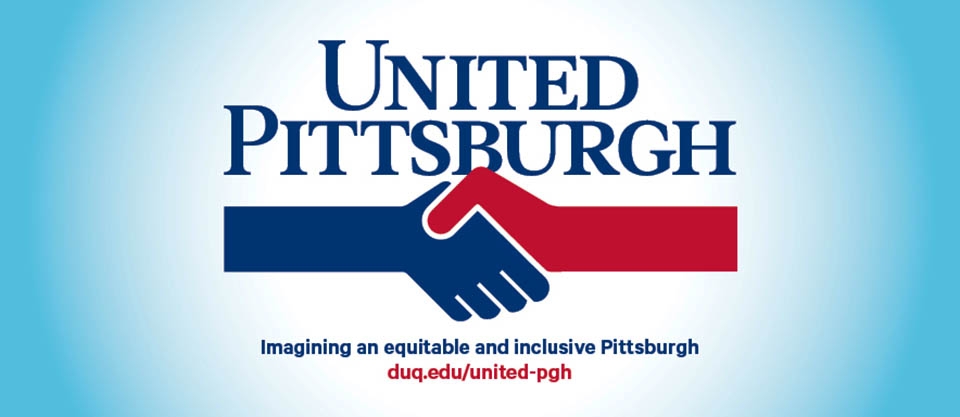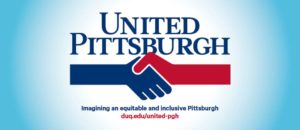

United Pittsburgh speaker series requires registration, which can be done online. The series will have over 10 speakers including President Gormley.
02/07/2019
Olivia Donia | staff writer
Duquesne is turning its focus outward as it partners with local activists and community leaders to bring United Pittsburgh, a speaker series with accompanying courses, to campus.
The program offers one undergraduate and one graduate course, both theology classes focused on ethics, civic awareness and intersectionality, that go hand-in-hand with the 10-week lecture series by community activists.
The United Pittsburgh program was developed by Duquesne’s Center for Catholic Faith and Culture (CCFC) after the office received a grant from the Henry Luce foundation. The grant enabled the office to start a multi-year program focused on bringing together students, academics and community activists.
“United Pittsburgh was modeled after a similar academic-community collaboration offered a few years ago by the University of Baltimore,” said Darlene Weaver, director of both the CCFC and the Core Curriculum. “‘Divided Baltimore’ brought together students, scholars, community activists and city residents to discuss that city’s history of racial and ethnic divisions and the role of political leaders, educational institutions, community and faith-based organizations and the citizens themselves to explore solutions.”
The initiative focuses on various social and ethical problems in Pittsburgh and discusses potential solutions to them. Some topics highlighted in the program include race, violence, empowerment and economic and health care disparity.
The speaker series accompanying the program includes lectures titled “Who is my neighbor?”, “What does belonging look like?” and “What is the difference between charity and equity?”
The nature of the United Pittsburgh initiative is designed to foster community involvement. By having courses and lectures given by both university faculty and community organizers, the United Pittsburgh initiative seeks to show how social justice and civic awareness operate outside of the classroom.
“By design, the courses are team taught by university faculty and prominent social justice advocates from the community to provide students with a comprehensive and first-hand look at how social justice issues play out in the Pittsburgh community,” said Weaver.
The program aims not only to showcase the academic side of these issues, but also the first-hand perspective on how things like inequality and urban planning impact Pittsburgh as a whole.
“The courses are important because they connect the field of theological ethics to our local context and to lived experience, thereby transforming student understanding of what it means to think and act ethically through a lens of engagement,” Weaver said.
But the United Pittsburgh program isn’t just for students; the speaker series, which runs for 10 weeks, is free and open to the the public, as well as Duquesne students and faculty. Most of the lectures are given Mondays on-campus in College Hall room 104 at 6:30 p.m. Featured speakers range from government officials to community activists, such as Samuel W. Black of the Heinz History Center and Rabbi James Gibson from Temple Sinai.
The United Pittsburgh initiative particularly aligns with Duquesne’s Spiritan mission, as it works to raise community awareness surrounding common social problems and their solutions.
“United Pittsburgh embraces many principles of Catholic Social teaching such as equality, dignity, solidarity, and participation as well as the particular Catholic, Spiritan mission of advancing the common good by working to build a more just and equitable world,” Weaver said.
The United Pittsburgh program is heavily focused on involving Duquesne in the greater Pittsburgh community, with the last lecture of the speaker series being titled, “What can universities contribute to a United Pittsburgh?”
“Community engagement is a top priority at Duquesne, as identified in the University’s five-year strategic plan…United Pittsburgh brings together a diverse group of stakeholders who can identify the root causes of current community problems and explore ways to understand and address them in an effort to forge a more equitable and sustainable future for the Pittsburgh region,” said Weaver.
The United Pittsburgh initiative, though begun by the CCFC and applying Catholic social teaching, is focused, above all else, on bettering Pittsburgh as a community and raising civic awareness for pressing ethical and social issues in the city.

